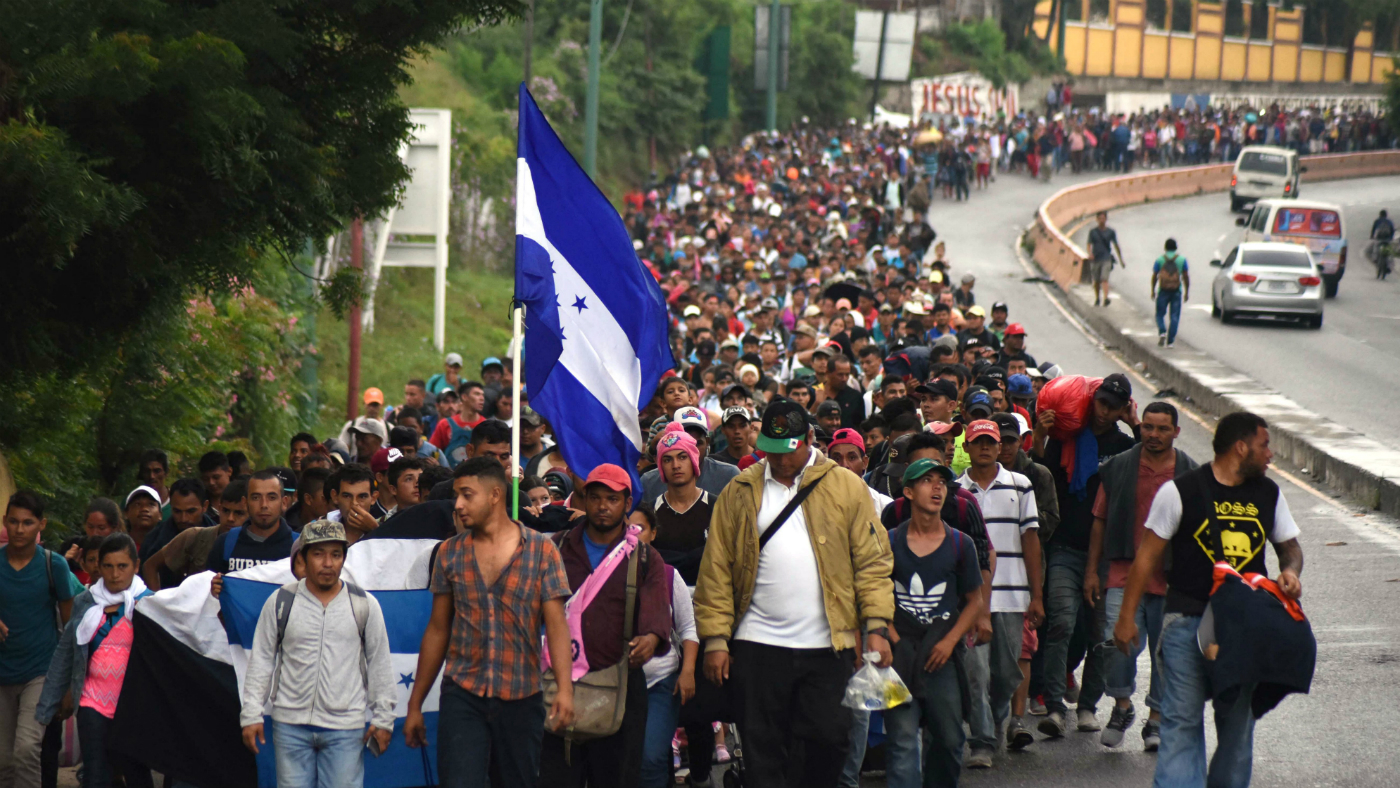Fact Check: will Trump’s tariffs solve his Mexico ‘immigration problem’?
US president announces 5% tax on all goods from neighbouring nation in bid to halt migrant influx

A free daily email with the biggest news stories of the day – and the best features from TheWeek.com
You are now subscribed
Your newsletter sign-up was successful
Donald Trump has declared a new tariff on Mexican imports and demanded that the country do more to stop illegal immigration into the US.
In a White House press statement, the US president said that a 5% levy would be imposed on all goods from the neighbouring nation from 10 June, and that the tariff would gradually increase up to 25% “until the illegal immigration problem is remedied”.
Trump has long accused Mexico of not doing enough to stem the flow of people across the border, alleging that Mexican authorities have made insufficient attempts to halt the so-called migrant caravans originating in Guatemala, Honduras and El Salvador, says the BBC.
The Week
Escape your echo chamber. Get the facts behind the news, plus analysis from multiple perspectives.

Sign up for The Week's Free Newsletters
From our morning news briefing to a weekly Good News Newsletter, get the best of The Week delivered directly to your inbox.
From our morning news briefing to a weekly Good News Newsletter, get the best of The Week delivered directly to your inbox.
The US president says that America has been “invaded by hundreds of thousands of people coming through Mexico and entering our country illegally”, and says that he will not back down on tariffs “unless and until Mexico substantially stops the illegal inflow of aliens coming through its territory”.
What is Trump claiming?
According to The Daily Telegraph, Trump has experienced “mounting frustration” at his failure to drive down illegal immigration numbers – a key pledge of his presidental election campaign in 2016.
The paper reports that the president has ramped up his anti-immigration stance this year by forcing out some of the most senior figures in Homeland Security, the government department that handles immigration, indicating he wanted “a tougher immigration approach”.
A free daily email with the biggest news stories of the day – and the best features from TheWeek.com
The Guardian says the biggest migration surge on the US-Mexican border in a decade has seen an average of 4,500 mostly Central American migrants arriving daily, “overwhelming the ability of border patrol officials to handle the numbers”.
During a White House briefing, a spokesperson said that the number could be far higher, with as many as 100,000 migrants passing through Mexico on their way to America’s southern border at “any one time”. The details of this claim are unclear.
But after Democrats in the House of Representatives put paid to Trump’s promise to build a wall along the length of the US-Mexico border earlier this year, the US president has been left with few options for fulfilling his pledge to drive down immigration. As a result, he has now strayed into controversial territory – tariffs.
“For decades, the United States has suffered the severe and dangerous consequences of illegal immigration,” Trump said this week after announcing the tariffs. “Sadly, Mexico has allowed this situation to go on for many years, growing only worse with the passage of time.”
“Mexico must step up and help solve this problem,” he added.
The White House has confirmed that the tariff will begin at 5% on 10 June and is due to rise to 10% on 1 July, 15% on 1 August, 20% on 1 September and 25% on 1 October. All goods imported from Mexico will be affected, The Daily Telegraph reports.
White House sources told Fox News that the US would remove the tariffs if Mexico stepped up its security efforts on the border, targeted transnational smugglers, cracked down on illicit bus lines and aligned itself with the US on a workable asylum policy. However, acting White House chief of staff Mick Mulvaney said the administration “did not set a specific percentage or specific number” for its threshold to remove tariffs.
What are the experts saying?
Commentators – including members of Trump’s own Republican Party – have come out in force against the prospect of new tariffs on Mexico.
To some, Trump’s extremely liberal use of tariffs as a political tool is objectionable and reckless. Chuck Grassley, the US Senate Finance Committee chairman and a Republican who represents Iowa, has slammed the move, calling it “a misuse of presidential tariff authority”.
“Trade policy and border security are separate issues,” Grassley said, adding that the proposal would “seriously jeopardise” the passage of a new trade deal involving Mexico, the US and Canada.
The BBC’s economics correspondent Andrew Walker suggests that Trump’s tariff proposal is “driven by a political issue – which is not to say that previous tariff moves did not have any politics behind them”. He says it is sure to have “financial and economic consequences”.
“Perhaps he hoped that a welcome side effect would be improved competitiveness for American industry,” Walker says. “Well, half the potential impact for the first stage in the proposed tariffs hikes was wiped immediately by a decline in the value of the Mexican peso, which has the effect of making Mexico a little more competitive, at least until the tariffs come into effect.”
The Guardian says that, if implemented, the measures are “bound to trigger retaliation that would hit Trump-supporting farming and industrial states”. The move could also shake financial markets at a precarious time for the president’s trade policy as the White House pressurises Congress to approve Trump’s revision of the North American Free Trade Agreement (Nafta).
Dow futures plummeted more than 200 points on Thursday evening after the president announced the new tariffs.
Even Beijing has weighed in on the move, with Chinese foreign ministry spokesman Geng Shuang expressing sympathy for Mexico.
“The United States has repeatedly taken trade bullying action. China is not the only victim,” he said.